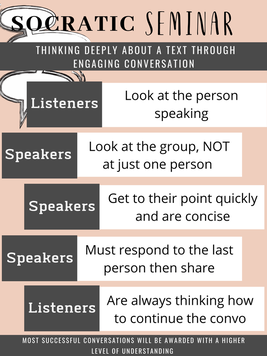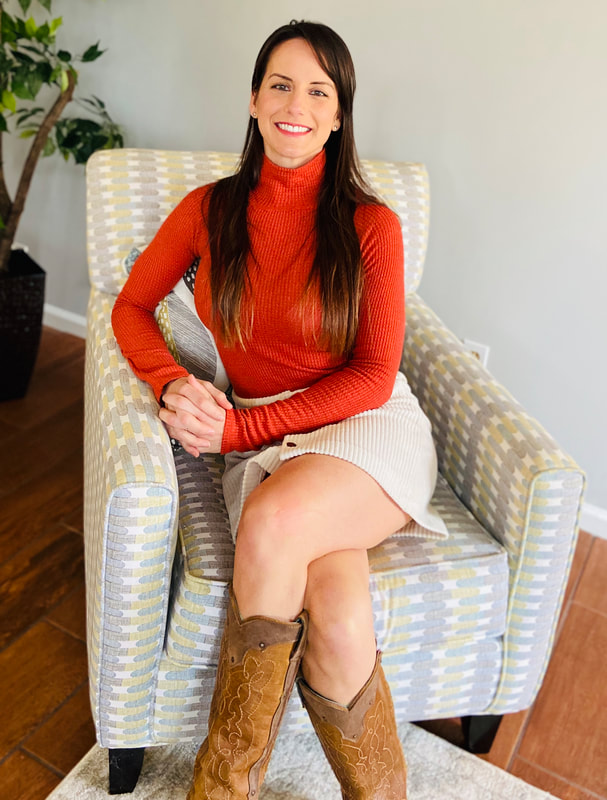
A big part of making Socratic seminars work in my classroom is explicitly teaching kids how to have a conversation with a group of people. The more specific I am about how to do this, the better it ends up being in the long run. The last thing you want to do is try to jump into Socratic seminars without giving them any guidelines and just assuming they will get it. They won’t. It will end up being a giant mess and it’s way harder to go back and try to redo something like this after it goes wrong rather than taking the time and setting the students up for success. Plus, if that is all you have planned for the period and it crashes and burns within the first 10 minutes, your stuck with nothing left to do the rest of the period.
At the start of this, I like to share an anchor chart of norms that I create before class. Usually, I encourage input from the kids when making any sort of protocol or norms, expect when it comes to Socratic seminars. The reason I don’t ask for their input is for two reasons. One, I think it helps set the tone of just how important it is to follow these norms. Especially if they are presented as a “set in stone”, non negotiable, anyone-who-does-Socratic-seminars-follows-these-norms type of thing. And two, most of them do not know how to have a group conversation. They are 11 and 12 years old. I wouldn’t expect them to know. We are doing something in our classroom that most teachers in the past never attempted with kids until high school.
The Norms
Now, before presenting them with a class text and diving right into conversations that are going to guide them in the project work we will be doing, I like to start with low stakes stuff. Plus, I need to get them into the habit of doing homework to prepare for the Socratic seminars. Teaching in middle school with 50 minute periods does not allow time for me to read texts as a class. Therefore, I start by giving them high-interest articles, usually from newsELA, articles I find on the internet or short stories such as Eleven by Sandra Cisneros.
The Circle Before I begin the conversation, the students will get into one big circle. We use chairs, but if I had a big enough rug, I would have them sit there. It’s your choice, but everyone needs to be able to see each other. No one is allowed to get away with quietly ejecting themselves from the circle pretending they are still in it (you know those students). I will make a big deal of just how important it is that we all see each others’ faces. Because it is. The Norms Next, I will go over every norm on the chart IN DETAIL. I will talk to them about how each is done and how it’s beneficial to a successful group conversation. I tell the kids that I know they like to talk and this is their opportunity to do so. I also remind them that eventually I will not be running the circle, they will be doing that so they need to learn how to do this right. The Practice When they are ready to start talking, we all have the text and notes in our hands. I begin with presenting a question to the group. I do not call on a hand. I wait for someone to just start talking. If no one begins then I will randomly choose a student. This can be a hard habit for students to break. As much as we think they shout out all the time or love to talk over each other. Getting them used to the idea of being allowed to just talk without my calling on them can be tough. The second someone breaks one of the norms, I call them out on it (in a kind way). Obviously the conversation is not going to run smoothly as I wouldn’t expect it to for the first month or so. I will interrupt as soon as something comes up and call it out for what it is so the kids know why I am so rudely interrupting their conversation. For example, if someone is looking at me and only me when they are talking, I will stop them and ask for them to address the group. After a few weeks of practice with high-interest text and thought-provoking questions prepared by the teacher, the Socratic seminars should start to feel less rigid and teacher directed. Be patient and give the kids a chance to fail and start over. Once they get into the groove of it, it’s really a beautiful thing.
How are Socratic Seminars in your class? Is there something specific you would want to finally figure out? Leave a comment below. We would love to hear from you!
Still not sure where to start?
1 Comment
|
Julia GrahamDaughter of the King, wife and mother, former upper elementary teacher, curriculum and course developer Archives
March 2023
Categories
All
|
Pages |
Resources |
|


 RSS Feed
RSS Feed